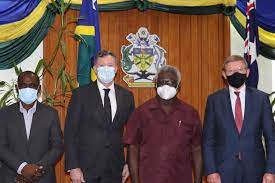Two of Australia’s top intelligence chiefs have quietly travelled to Solomon Islands to meet Prime Minister Manasseh Sogavare and raise the government’s deep concerns over a security agreement that the Pacific Island nation is on the cusp of signing with China.
Late on Wednesday, Sogavare’s office issued a statement revealing he’d held what he called a “positive” meeting with a “special envoy” sent to Honiara by Prime Minister Scott Morrison.
Sogavare’s office also posted a picture of him standing with Paul Symon, who is the head of the overseas spy agency the Australian Secret Intelligence Service (ASIS), and the Director-General of the Office of National Intelligence Andrew Shearer.
A spokesman for Morrison declined to comment on the visit by Symon and Shearer.
But Sogavare’s office said the men discussed “Australia’s core security concerns” about the broadly worded security agreement, which Australian officials and politicians fear could lay the legal groundwork for a Chinese military presence in Solomon Islands in the future.
“The meeting provided a platform for the two countries to better understand each other in particular on Solomon Islands’ decision to its broadened security partnership with China and other countries,” the statement said.
The statement called the meeting a “talanoa” session, using a word which means an inclusive and transparent dialogue designed to share perspectives and reach agreements based on mutual respect.
It also declared that “Australia remains our partner of choice” and said trust was “being cemented between the two sovereign states”.
But there was no indication in the statement that Sogavare’s government is willing to soften its position or abandon the deeply contentious agreement with China.
The statement pointedly said that China remains an “important trading partner for both countries2 and makes it clear that the government is not prepared to abandon efforts to strike security pacts with more countries.
Several Australian government ministers have publicly raised concerns about the pact since it was leaked online last month.
It has since been “initialled” by top officials from China and Solomon Islands, but not yet signed and formalised by their foreign ministers.
Last month, Morrison said the agreement showed the “constant pressure” being placed on Pacific states, and earlier this week a top US admiral labelled the security negotiations between Honiara and Beijing “very concerning.”
Sogavare lashed out at critics of the pact during a fiery address to parliament last week, insisting there was no prospect of a Chinese military base in Solomon Islands, and saying it was “insulting” to suggest his country couldn’t navigate its relationship with Beijing.
China’s government has also berated Australia for publicly criticising the deal, accusing it of paranoia and trying to undermine the sovereignty of Solomon Islands.
Morrison and the Pacific Minister Zed Seselja have rung several Pacific counterparts to try and coordinate a united regional response to the development.
Some Pacific Island nations are also uneasy about the agreement and the prospect of China striking its first bilateral security deal in the region, although few Pacific leaders have waded into the public furore.
The Prime Minister of Papua New Guinea James Marape told the ABC earlier this week that other states in the region were “conscious” of events in Solomon Islands and wanted to discuss the matter at the Pacific Islands Forum leaders meeting this year.
Samoa’s Prime Minister Fiamē Naomi Mataʻafa also did not criticise the security pact but said Pacific Island countries had to hammer out a collective response to growing geopolitical competition in the region.
The controversy over the agreement has also stoked domestic political controversy in Australia.
The government has denied Labor’s declaration that Australia was “blindsided” by the leaked deal, with Deputy Prime Minister Barnaby Joyce saying Australian intelligence agencies were “all over2 what was happening.
Foreign Minister Marise Payne also told Senate Estimates that Australia had been aware of security negotiations between China and Solomon Islands for quite some time, although she conceded she only learned about the specific agreement when the draft was leaked publicly.
SOURCE: ABC/PACNEWS













